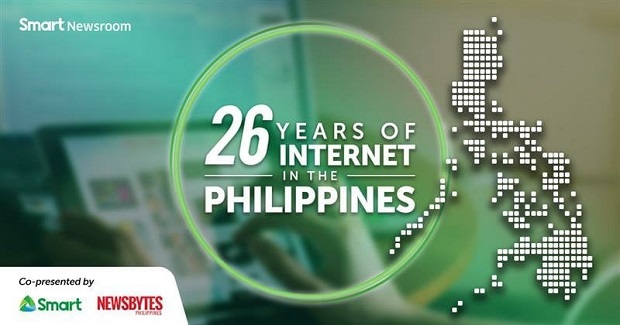Now that the country is in a lockdown due to the Covid-19 contagion, Filipinos working or staying at home are benefiting immensely from the Internet. It is therefore only appropriate that we commemorate that fateful day 26 years when the Philippines first got online.

By now, however, you already have a pretty good idea of its potentials and pitfalls. Compared to the typical user from the ‘90s, we’re all experts at using this marvel of technology because for the lot of us, we’ve grown and matured alongside it. We wrote the rules that govern it, we abided by them, and we, inevitably, broke them from time to time.
Since 1994, a number of government regulations have been put in place to instill order in the chaotic virtual world. Much to the chagrin of those who believe that the Wild Wild Web should be completely free and open, laws and regulations have to be introduced at some point. Yes, we still enjoy a number of liberties online, but now it’s more structured — think of it as organized fun like a round of Monopoloy or Dungeons and Dragons.
Here are the laws and government policies that have shaped our version of the Internet and made it what it is today.
1995 March 01: Republic Act 7925 a.k.a. the Public Telecommunications Act of the Philippines
- The granddaddy of it all, this is the law that liberalized the telecom industry and put it on a path of hypergrowth. It allowed companies offering value-added services such as text messaging and data to operate without a congressional franchise, essentially speeding up the establishment of telcos thus ushering in the age of mobile. Simply put, we grew up in a country where everyone has a phone because of this piece of legislation. RA 7925 essentially kick-started the Filipinos love affair with the cellphone.
2000 June 14: Republic Act 8792 a.k.the Electronic Commerce Act of 2000
- RA 8792 provided the framework and direction on how Filipinos could make the Internet a legitimate ‘place’ of business. Its passing showed that the country was ready and dead-serious in providing a conducive and protected environment for online transactions. Prior to the passing of this law, anyone engaging in business online had little to no protection.
2000 July 12: Executive Order No. 264
- Recognizing the high-growth potential of ICT and e-commerce, the Information Technology and Electronic Commerce Council (ITECC) was formed. Chaired by the President of the Philippines, ITECC was the highest policy-making body of the Philippines merging the National Information Technology Council (NITC) and the Electronic Commerce Promotion Council (ECPC) 2000
2004 January 12, 2004: Executive Order 269 mandating the creation for the Commission on Information and Communications Technology (CICT)
- While the Internet has been around for about a decade at this time, its full potential remained untapped as there was no one government institution or agency that was tasked to provide a clear direction for its future. The CICT was created to provide that guidance; unfortunately it would take more than a decade before it was given enough muscle to actually get things done.
2011 June 23: The CICT was dissolved and created the ICT Office under DOST
- One step forward, two steps back is what best describes what happened in 2011. With decreased powers, Philippine Internet’s future and its power to contribute to society was put in limbo. If there’s any consolation, the person put in charge of the ICTO — Louis Casambre — was pretty efficient and still able to push for some vital ICT reforms.
2012 August 15: Republic Act 10173 a.k.a. the Data Privacy Act of 2012
- With data fast becoming the most precious commodity in the world, the Philippines created the National Privacy Commission (NPC) that will ensure the protection of every Filipinos’ right to keeping their data online private. In simple speak, no person or entity has the right to use or exploit your personal information for their gain without your consent.
2012 September 12: Republic Act 10175 a.k.a the Cybercrime Prevention act of 2012
- There’s crime in real life and there are crimes online. There are consequences for committing crime in real life, and so should there be consequences for committing crime online. It took a while to enact such an obviously necessary law, but this is the one piece of legislation that finally put some “teeth”, so to speak, into enforcing laws online.
2016 May 23: Republic Act 10844 a.k.a Department of Information and Communications Technology Act of 2015
- Finally, ICT has been given the importance that it should have been decades ago. As a legitimate part of the cabinet, ICT now has a direct line to the President of the Republic of the Philippines. No different from your office’s or school’s “IT Department”, DICT oversees projects and programs such as the nationwide Wi-Fi hotspots project.
2017 August 02: Republic Act 10929 a.k.a The Free Internet Access in Public Places Act
- Realizing that free access to the Internet is necessary for the general public, RA 10929 sought to make WiFi available in government offices, educational institutions, health establishments, transport hubs, and other public places. The widespread Internet access and availability is seen to be a huge boost to education and research and is envisioned to promote tourism through user-generated posts on social media. So yes, you can take pride in the fact that your Instagram check-ins are helping the economy.
Indeed a lot of work has already been done, but the Internet’s evolution is far from over. It has proven itself to be a catalyst of change for millions across the country, and it will continue to do so for the rest of human history. We can only hope, though, that we as a nation will be able to strike the perfect balance between its perils and promises.




